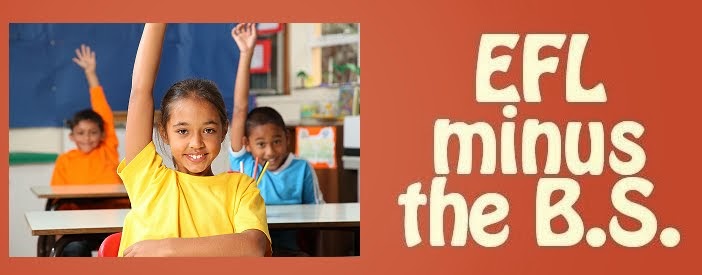SORRY, NO COMPRENDO
I’m sure you’ve all experienced this situation. You come
home from work, plonk yourself down in front of the TV, and watch the news.
Then your significant other walks in and asks, “What’s on the news today?” You
reflect on it for a moment, then realize that not one word of the half-hour
broadcast has registered on your brain. You heard the words, you understood the
words, but your brain had not absorbed them. Your mind had switched itself off.
Gone into hibernation.
It’s the same for our students, only doubly so, because it’s
not their language they’re listening to.
“OK, now we’re going to do some writing, so take out your
notebooks.” One third of the class does so, the rest sit motionless, staring
blankly ahead. You repeat the instruction, only this time a little louder, and
at the same time wave a notebook in the air. Two more students comply. If you
want 100% of the class to comply, you have to stand in front of each student,
say “notebook” several times, while tapping a finger on their bags. Arousing a
hibernating mind doesn’t come easily.
Adult students’ minds will go blank and unreceptive from
time to time, teenagers do it a lot, young children hardly ever. With adults,
it’s understandable. Like you or I, they have other concerns – money worries,
family issues, kids’ problems, work problems – that occupy the mind far more
compellingly than a grammar lesson ever could. With teenagers, it’s even more
understandable. Their preoccupations are teen angst, and school. Asian kids’
school schedules are demanding; fourteen different subjects a week, tons of
stuff to be memorized. Sure, most of it’s rote-learning, but even that can tire
you out.
Here’s another barrier to understanding. There are some taxi
drivers, shop-keepers and students who see a white face before them, see the
lips moving, and think “Oh my God. He’s speaking to me in a foreign tongue! I’m
not going to understand a word!” Consequently, they don’t understand a word,
even if you’re saying it in their own language, and regardless of whether it’s
clear, accent-free, and fluent. Sorry, the mind’s in neutral today.
And now for something completely different. Songs. Or to be
more explicit, songs and their role in language learning. Students learn
language faster if it’s taught in song form, there’s no doubt about it. Kids
who are currently studying “What’s this?” and “Is this a pencil?” can be taught
to sing the words of songs like “Clementine” and “If you’re happy and you know
it” confidently and with obvious enjoyment. Especially if they’re action songs.
“This is the way I wash my face”, “Head, shoulders, knees and toes” and “Bingo”
come to mind. If you can’t sing a note, buy one of the many kids’ songs CDs to
present the song. Teenagers love love songs. Explain the poignant love story
behind the song and they’ll appreciate it even more. “Now let me tell you about
John. John is in love with Bonnie, but there’s a problem. John lives in
America, but Bonnie lives in Vietnam (or Thailand, or Indonesia, or Adis Abba.)
And so he sings this song to her: ‘My Bonnie lies over the ocean, my Bonnie…’.
“
When I worked in Korea, my school had a series of tapes
called ‘Mr Monday’. These tapes contained songs – quite catchy, many of them – each
of which practiced specific vocabulary or a grammar point. One song covered days
of the week, one did months or the weather, others consisted solely of present
perfect sentences, or conditional clauses. Brilliant, it was. I wish I’d made a
copy, as I’ve never seen ‘Mr Monday’ before or since then.
I have experimented with writing my own songs to practice
certain language. It’s easier than it sounds. Take ‘Frere Jacques’ or ‘John
Brown’s Body’ and put your own words to them. So far I’ve done the treatment on
‘Frere Jacques’, substituting the words: “We learn English, we learn English,
yes we do, yes we do, but it isn’t easy, but it isn’t easy, no, no. no, no, no.
no.” I do “John Brown” to the words: “I like ice cream and I eat it every day
(X3), but my Mom says I’m gonna get fat. Mama, Mama give me ice cream (X3) I
don’t care if I get fat.” Subsequent verses feature chocolate, hamburgers, and
so on. Here’s another one I put to the tune ‘Frere Jacques’. “Today is
Saturday, Yes that’s right, Tomorrow must be Sunday, That’s right too.” Rogers
and Hammerstein it ain’t, but it does the trick, and the kids seem to enjoy it.
Try doing your own song. It’s fun.
I remember one time passing by a class of eight- to ten-year
olds singing the Beatles song ‘Hello, Goodbye’. I’ve heard the song many times
before, but the words from the mouths of these young kids gave the song an
entirely new perspective, and an entirely new meaning. The Beatles obviously
wrote it as a nonsense song; the children imbued it with a depth of meaning
Lennon and McCartney had never dreamed of. The purity and innocence of their
voices had me choking back tears.
xxxxxxxxxxxxxxx
My new book, EFL minus the B.S., is
now available on Amazon. If
you’re looking for a weighty tome on pedagogy, and the meta-cognitive paradigms
of second-language acquisition, give this book a miss. If, on the other hand,
you’re looking for an entertaining dissection of the English teaching game
worldwide, EFL minus the B.S. is the book for you. Order your copy today
from Amazon.

No comments:
Post a Comment